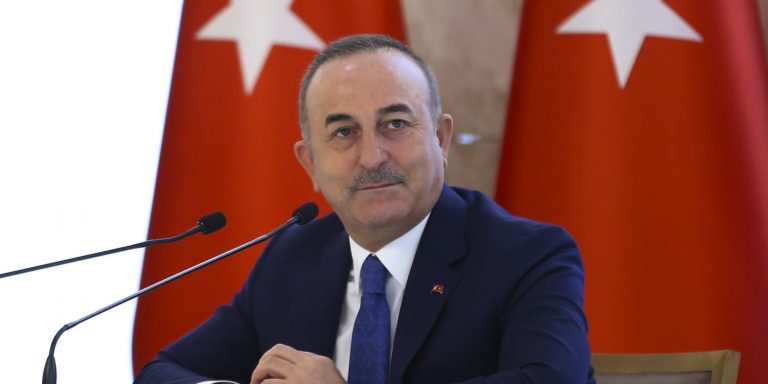INTELBRIEF
March 25, 2021
IntelBrief: The Geopolitical Implications of Turkey’s Relationship with Central Asia

Bottom Line Up Front
- Turkey is leveraging cultural, ethnic, and linguistic ties to make inroads in Central Asia and compete with China and Russia for regional influence.
- Central Asian states could seek to balance against the encroachment of China and Russia by turning to Turkey as a viable alternative.
- Under Erdogan, Turkey has pursued an aggressive foreign policy by expanding its military footprint from North Africa to the Caucasus.
- However, several domestic and geopolitical challenges on the horizon could hinder Ankara’s push to make further inroads in Central Asia.
In a sign that Ankara is seeking to make renewed inroads in Central Asia, Turkish Foreign Minister Mevlut Cavusoglu visited three of the five states in the region in early March—Turkmenistan, Uzbekistan, and Kyrgyzstan. Since the collapse of the Soviet Union, Turkey has made concerted efforts to leverage historic, cultural, ethnic, and linguistic ties to establish a sphere of influence in Central Asia. However, these efforts were largely eclipsed by Russia, which successfully maintained its economic and security primacy in the region. Under Turkish President Recep Tayyip Erdogan, Turkey’s expanded military footprint abroad, most recently in Nagorno-Karabakh, may have opened up an opportunity for Turkey to revive relations with a region seeking to balance external pressures from Russia and China.
Central Asia occupies a strategic role on the Eurasian continent. Russia, China, the European Union, India, Iran, and Turkey each have different economic, political, energy, and security interests in the region. The dominant foreign powers in Central Asia are Russia and China, with Russian being the lingua franca in much of the region. However, Beijing’s investment in security and development, largely through the Belt and Road Initiative, has positioned China as the primary economic power in the region. Moscow has remained the security guarantor of the region, but China’s increasing security inroads could lead to friction as Beijing infringes on Russia’s traditional sphere of influence. The Central Asian countries will seek to balance against the encroachment of their much more powerful neighbors, and Turkey may serve as a viable alternative to the current dominant powers. Although, it remains to be seen whether Turkey can match the security and development power of Russia and China, respectively.
Building on existing multilateral cooperation mechanisms, such as the Cooperation Council of Turkic-Speaking States (CCTS) — also known as the Turkic Council — Turkey may further assert its role in the region. With the inclusion of Uzbekistan as a member in 2019, the CCTS represents a population of over 140 million, with a combined GDP of $1136 billion. The three Central Asian members of CCTS — Kazakhstan, Kyrgyzstan, and Uzbekistan — all participate in different Russian or Chinese-led multilateral efforts, such as the Collective Security Treaty Organization (CSTO) and the Shanghai Cooperation Organization (SCO). The CCTS may be an attractive route for Central Asian member states to strengthen their positions vis-à-vis more powerful neighbors, and provide a different economic and security structure compared to those dominated by Beijing and Moscow.
Under Erdogan, Turkey has pursued an increasingly aggressive foreign policy through strategic expansion of its military footprint abroad to gain a foothold in myriad regions of geopolitical significance. In Libya, Turkey’s reliance on mercenaries and drones proved successful in diminishing the advance of warlord Khalifa Haftar and his Libyan National Army — and international backers, Russia, Egypt, and the UAE — against the UN-recognized government. To support Azerbaijan in the conflict against Armenia in Nagorno-Karabakh, Turkey deployed Syrian mercenaries. Ankara also maintains an active military footprint in Syria, Iraq, and Somalia. Increased inroads and influence in Central Asia provide Turkey with several benefits, including increased trade, energy security, and potential geopolitical influence. On March 12, Turkey’s Foreign Minister announced plans to host Afghanistan peace talks in Istanbul in April, to complement the Doha peace talks. Ensuring alignment with some of Afghanistan’s Central Asian neighbors may have been a strategic goal of the Turkish Foreign Minister’s recent visit to the region.
Yet, there are domestic and geopolitical challenges on the horizon that could hinder Ankara’s push to make further inroads in Central Asia. The domestic situation in Turkey — including the flailing economy that has been exacerbated by the COVID-19 pandemic — is one significant obstacle. For now, Ankara has opted to mute its rhetoric supporting the Uighurs in Xinjiang — currently subject to a stringent program of “reeducation” that the US has labeled a genocide — in exchange for deepening economic ties with Beijing. Indeed, under Erdogan, Turkey has deepened cooperation with authoritarian regimes while putting a strain on Ankara’s relationship with NATO allies and the European Union. Yet, Russia and Turkey have often ended up on opposing sides in regional conflicts, including in Syria, Libya, and Nagorno-Karabakh. While Central Asian states and Turkey may see opportunity in re-energized relations, Moscow and Beijing may not look favorably on such a development.